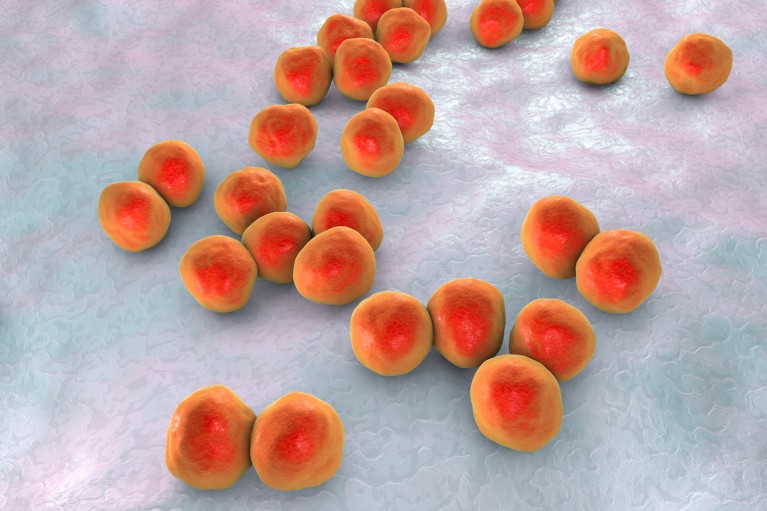
A bacterial grouping that features the genus Veillonella (artificially colored) has been linked to a decrease charge of response to most cancers immunotherapy. Credit score: Kateryna Kon/Science Photograph Library
Regardless of their small dimension, intestine micro organism wield massive affect over the effectiveness of sure most cancers medicine. Researchers have now discovered that the ratio of particular microbial communities within the intestine may help to foretell who will reply to next-generation medicine for treating some sorts of most cancers1.
The findings may even assist to establish wholesome volunteers who might donate faecal micro organism to switch into the intestines of people that don’t reply to those medicine, a process often called faecal microbiome transplantation, examine co-author Laurence Zitvogel, an immunologist and oncologist on the Gustave Roussy Most cancers Campus in Villejuif, France, wrote in an e-mail to Nature.
The work “is a breakthrough from a diagnostic perspective”, says Fabio Grassi, an immunologist on the Institute for Analysis in Biomedicine in Bellinzona, Switzerland. The findings, he says, additionally spotlight how the fragile stability of intestine microbial species can have an effect on the success of high-stakes therapies, reminiscent of immune checkpoint inhibitors. This remedy helps the immune system to acknowledge and assault most cancers cells and is the main target of the brand new analysis. The findings have been revealed at present in Cell.
Seek for helper micro organism
Over the previous decade, Zitvogel and others have investigated how intestine microbes work together with these most cancers remedies in ways in which activate the immune system. “Everybody was searching for that single bug that [could] enhance response to immunotherapy throughout most cancers varieties — and it was elusive,” says Jennifer Wargo, a physician-scientist on the College of Texas MD Anderson Most cancers Middle in Houston. In 2018, Wargo revealed a examine2 — alongside comparable ones by Zitvogel3 and a 3rd crew4 — that linked particular intestine micro organism to constructive scientific outcomes following immunotherapy remedy in mice and folks with most cancers. However there was little settlement on which microbial species have been related to remedy response.
Wargo says that Zitvogel’s newest analysis helps to reply why the seek for a single intestine microbe that would increase responses to most cancers immunotherapy was so difficult. As a substitute of specializing in particular person microbial species, the work reveals that the general make-up of microbial communities within the intestine influences an individual’s response. “It’s all concerning the neighborhood construction,” Wargo says.
Why are so many younger individuals getting most cancers? What the info say
Zitvogel and her colleagues analysed faecal samples from 245 individuals with lung most cancers and recognized two teams of microbial species: group one contained 37 microbes, reminiscent of Veillonella species, which are linked to resistance to immune checkpoint inhibitors; group two included 45 bacterial species related to constructive responses. Individuals with lung most cancers with response-associated micro organism lived longer than did these with resistance-associated micro organism.
Subsequent, the researchers developed a person-specific rating primarily based on the ratio between group one and group two. The rating additionally included quantification of Akkermansia muciniphila, a microbe that has gained consideration owing to its potential position in influencing immune responses.
When examined on a whole bunch of individuals with numerous kinds of most cancers, together with kidney most cancers, the rating might predict usually who was seemingly to answer remedy with immune checkpoint inhibitors. The rating will quickly be reworked right into a diagnostic assay, Zitvogel wrote.
Attainable predictive device
The device might assist to establish individuals with most cancers who would possibly want microbiome-targeting therapies to spice up their response to immunotherapy, however it requires additional validation earlier than it may be used within the clinic, says Francesca Gazzaniga, a biologist at Massachusetts Common Hospital in Boston.
She additionally notes that the examine targeted on individuals in Canada and France, so the rating won’t be as predictive in populations dwelling in several areas and consuming completely different diets, Gazzaniga says. “It is a good begin, and if we perceive extra concerning the underlying mechanisms — why these units of micro organism are essential — we would be capable to get higher focused therapies.”
Analysis on the position of microbiota within the response to immunotherapy started years in the past, but there have been no tangible advantages for sufferers thus far, says Maria Rescigno, an immunologist at Humanitas College in Milan, Italy. All the identical, Rescigno anticipates that docs will combine the device developed by Zitvogel and her crew into observe. “If clinicians undertake this, it might result in a big change for the sufferers.”



